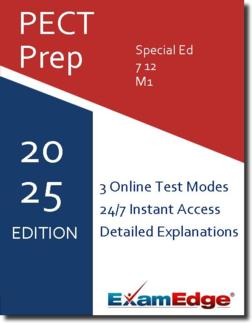PECT Special Ed 7-12 M1 ( Special Ed 7-12 M1) Practice Tests & Test Prep by Exam Edge - Topics
Based on 17 Reviews
- Real Exam Simulation: Timed questions and matching content build comfort for your PECT Special Ed 7-12 M1 test day.
- Instant, 24/7 Access: Web-based PECT Special Education 7-12 Module 1 practice exams with no software needed.
- Clear Explanations: Step-by-step answers and explanations for your PECT exam to strengthen understanding.
- Boosted Confidence: Reduces anxiety and improves test-taking skills to ace your PECT Special Education 7-12 Module 1 (PSE7-12M1).

Understanding the exact breakdown of the PECT Special Education 7-12 Module 1 test will help you know what to expect and how to most effectively prepare. The PECT Special Education 7-12 Module 1 has multiple-choice questions The exam will be broken down into the sections below:
| PECT Special Education 7-12 Module 1 Exam Blueprint | ||
|---|---|---|
| Domain Name | % | Number of Questions |
| Foundations and Professional Practice | 33% | 14 |
| Understanding Students with Disabilities | 33% | 14 |
| Assessment and Program Planning and Implementation | 33% | 14 |


